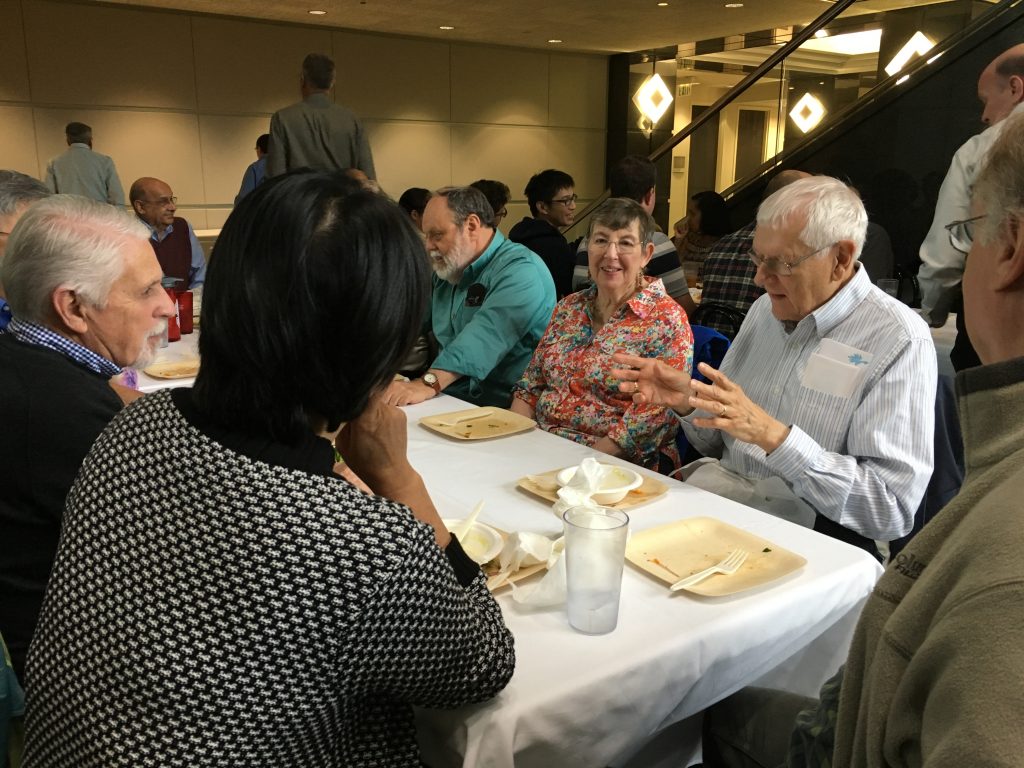Binkowski celebrates 80th birthday with colleagues
June 4, 2017
Photo by Liz Adams
A profile of Francis “Frank” Binkowski
Over 80 years of his life, Francis (Frank) Binkowski has become a man of many titles—student, researcher, father, veteran, adventurer, among others—a reflection of how he has managed to pack his life to the brim. But, Binkowski remains modest about his numerous accomplishments and his vow to continue working on helping the environment and budding atmospheric scientists.
He recently celebrated his 80th birthday surrounded by colleagues, family and friends.
“It’s been an interesting trip,” he said of this recent milestone.
Binkowski, and his parents, always dreamed he would go to college. As the time neared for him to begin, the U.S. was increasingly engaging in the Vietnam War. At the age of 18, Binkowski joined the National Guard and a year later, began attending college at Rutgers University.
During his junior year of college, Binkowski was transferred to the Air Force Reserves after advancing through the ranks of ROTC. Noticing his mental aptitude and interest in weather, his superiors made him a weather officer.
In his last year at Rutgers, Binkowski met the love of his life, Sally. By chance, they became study partners and quickly fell in love.
He finished his undergraduate degree in mathematics while dating Sally, and began attending New York University to continue his education as a weather officer. During his first year of graduate school, Binkowski proposed to Sally at an officer’s club and got married shortly after.
“We’ve been married 56 years this year,” he said smiling.
Halfway through, however, Binkowski was called to war and spent just under a year in Vietnam.
After returning home, Binkowski—now a husband and father—completed his master’s degree and doctorate for meteorology.
Binkowski returned to Rutgers to teach undergraduate classes for a few years, but was drawn to atmospheric research. Following the call of a friend, he and his family packed up and moved to North Carolina, where he began his career with the Environmental Protection Agency (EPA).
It was at the EPA that Binkowski began working on atmospheric models and the effects of air pollution.
“If we want to reduce pollution in certain areas, we have to have a model of the atmosphere and put everything we know about it in the model—which isn’t much—and put in a mathematical form,” Binkowski said.
During his career, Binkowski helped create the Community Multiscale Air Quality (CMAQ) model, EPA’s regulatory regional chemical transport air quality model. As new research reports came in, he and his team would add more and more information to it, making it better and better. A member of a new group called CMAS (Community Modeling and Analysis System), Binkowski and his team were able to use their atmospheric model to help in environmental policy development.
To this day, the model is still being improved and used. In the current political climate, Binkowski said, it’s going to be more important than ever to keep improving the model and using it for pollution control.
Binkowski retired after 26 years with the EPA, but couldn’t stop working for long. When the University of North Carolina asked him to join their ranks as a research professor a few years after his retirement, he accepted and never looked back. Now he continues to work part-time with the EPA to fund his research at UNC and teaches a class every now and again.
“So I’m this old guy, garrulous old guy, who talks a lot and doesn’t always makes sense, jumps from one thing to another, but I work because I want to—not because I have to. I enjoy what I do,” he joked.
With any spare time, Binkowski travels the world with his wife and four sons and reads voraciously. His insatiable curiosity and spirit of adventure combined with his impeccable memory make Binkowski a living reservoir for history facts and information.
In his office, Binkowski has two pictures on his wall: an image of Copernicus and a quote by St. Francis, both of whom, in his travels, Binkowski has visited at their final resting sites.
“Science and faith—the two fit together,” he said.
Throughout his 80 years, those two pillars have been his life philosophy as a scientist and a Lutheran.
“You have to recognize in science you ask the question how does it work and the mechanisms that explain things in the universe,” he said, “Faith asks why—why are these things here.”
